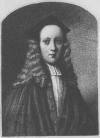A Christian, in so catholic a sense,
Can give to none, but partial minds offence;
Forc'd to live under some divided part,
He keeps entire the union of the heart,
The sacred tie of love; by which alone
Christ said that his disciples should be known.
He values no distinction, as profest
By way of separation from the rest;
Oblig'd in duty, and inclin'd by choice,
In all the good of any to rejoice;
From ev'ry evil, falsehood, or mistake,
To wish them free, for common comfort's sake.
Freedom, to which the most undoubted way
Lies in Obedience (where it always lay)
To Christ himself, who with an inward call
Knocks at the door, that is, the heart of all.
At the reception of this heav'nly guest
All good comes in, all evil quits the breast.
The free receiver, then becomes content
With what God orders, or does not prevent
To them that love him, all things, he is sure,
Must work for good, though how, may be obscure;
Even successful wickedness when past,
Will bring to them some latent good at last.
Fall'n as divided churches are, and gone
From the perfection of the Christian one.
Respect is due to any that contains,
The venerable, though but faint remains.
Of ancient rule, which had not, in its view
The letter only, but the spirit too.
When that variety of new-found ways,
Which people so run after in our days,
Has done its utmost, - when, Lo here, lo there,
Shall yield to inward seeking and sincere;
What was at first, may come to be again,
The praise of Church-assemblies amongst men.
Mean while, in that to which we now belong,
To mind in public lesson, pray'r and song,
Teaching and preaching what conduces best,
To true devotion in the private breast,
Wishing increase of good to ev'ry soul
Seems to be our concern upon the whole.
To God, and Christ and holy angels stand,
Dispos'd to ev'ry Church, in ev'ry land,
The growth of good still helping to compleat,
Whatever tares be sown among the wheat;
Who would not wish to have, and to excite,
A disposition so divinely right?






